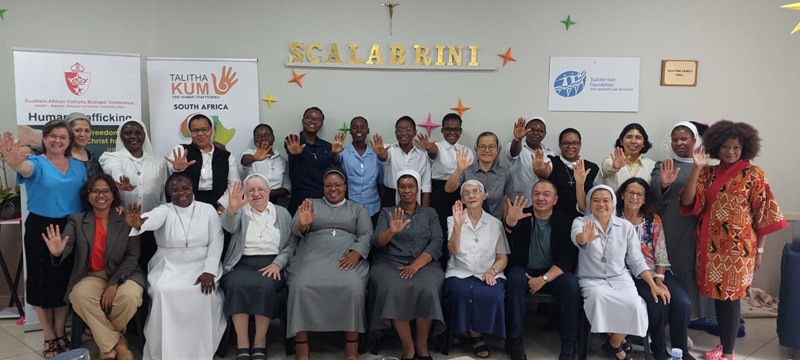Women religious and consecrated persons in South Africa gathered at the Mother Assunta Training Centre in Kensington, Johannesburg, to discuss the scourge of human trafficking.
The workshop, hosted by the SACBC Migrants, Refugees, and Human Trafficking Office, under the theme ‘Religious Life Against Human Trafficking’, provided a platform for religious leaders and activists to share experiences, raise awareness, and strategize ways to protect and empower vulnerable individuals.
A Call to Action: Women Religious as Agents of Change
During the Thursday, March 6, workshop, representatives from various congregations and religious communities reaffirmed their commitment to protecting human dignity and providing shelter and support to victims of trafficking.
In a conversation with the Southern African Catholic Bishops Conference (SACBC) communication office, National Co-ordinator of Talitha Kum Network Sr Jane Mohlala from the Congregation of the Sisters of St Paul (SCP) highlighted the critical role of religious organizations in filling gaps left by governments.
“The government does not have enough shelters, but religious communities have been providing safe spaces for years,” said Sr Mohlala SCP.
During the workshop, women religious emphasized their mission to transform society through compassion, advocacy, and direct action. Their efforts include providing shelter, psychological support, and skills training to help survivors regain their independence. “Many victims, through education and vocational training, have successfully reintegrated into society and secured employment,” said Sr Mohlala.
Testimonies of Survival and Hope
The workshop also served as a reminder of the vulnerabilities of migrants and refugees. Speaking to the SACBC communication office, Sr Thao Phi from the Congregation of Franciscan Missionaries of Mary (FMM), who is originally from Vietnam, shared her personal experience as a refugee, recalling how her family fled persecution and was resettled in the United States through the support of international migration organizations.
“This workshop reminds me of how vulnerable we are as human beings, especially as migrants, refugees, women, and children. But it also empowers us with information and the strength to fight against human trafficking together,” said Sr Phi FMM, who also serves as the Secretary General of the Leadership Conference of Consecrated Life – Southern Africa (LCCLSA).
Strengthening Networks and Collaboration
Fritiana Nur, a regional protection specialist from the International Organization for Migration (IOM), provided training on identifying trafficking cases and strengthening protection mechanisms. She praised the commitment of religious communities, acknowledging their crucial role in advocacy and victim support.
“Religious sisters and brothers already have a deep understanding of human trafficking. This workshop is about reflecting on what more we can do and strengthening our collaboration,” said Fritiana Nur.
A Message for International Women’s Month
As the event concluded, participants shared a message of solidarity and empowerment for International Women’s Month. They called for greater accountability, inclusion, and recognition of women’s contributions in society.
The workshop reinforced the vital role of women religious in Southern Africa as protectors, advocates, and changemakers, as their work, grounded in faith and service, continues to offer hope and healing to the most vulnerable in society.


0 Comments